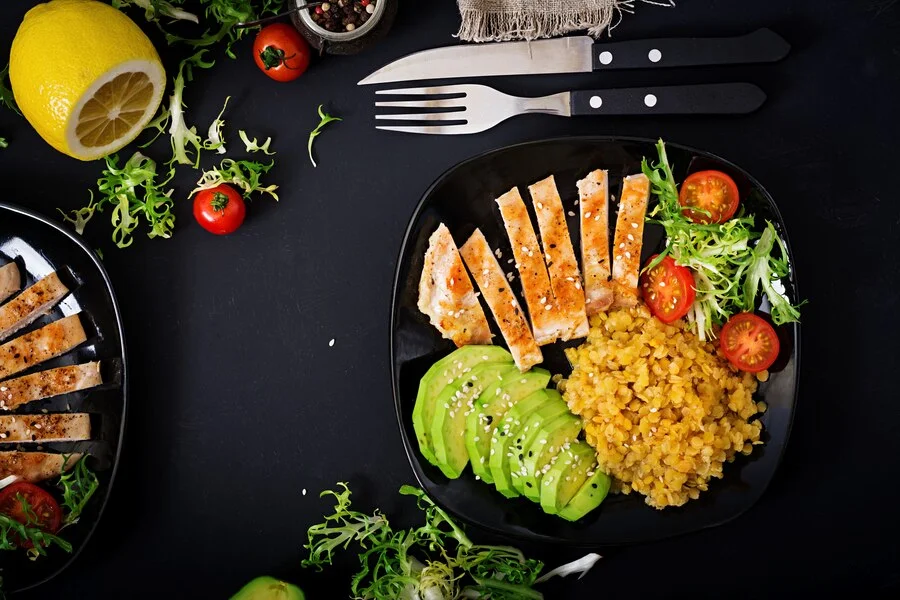Dinnertime during a busy week can feel like a battle. You’re short on time, inspiration might be lacking, and the idea of spending hours in the kitchen is enough to make you order takeout. But fear not! This collection of delicious recipes will have you whipping up healthy, flavorful meals in under 30 minutes.
Za’atar Salmon with Creamy Lemon Tahini Sauce (25 minutes)
Calling all seafood lovers! This recipe combines the vibrant flavors of the Middle East with protein-packed salmon. Zesty sumac and earthy za’atar create a delicious crust on the fish, while a creamy lemon tahini sauce with wilted spinach adds a touch of luxury.
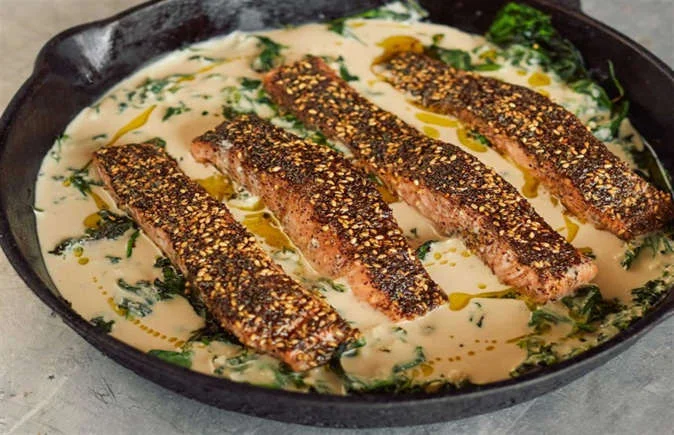
Table: Za’atar Salmon with Creamy Lemon Tahini Sauce
| Ingredient | Quantity |
|---|---|
| Salmon fillets | 4 |
| Za’atar | 2 tbsp |
| Sumac | 2 tsp |
| Olive oil | 2-3 tbsp |
| Baby spinach | 250 g |
| Tahini | 90 g |
| Garlic cloves, crushed | 3 |
| Lemon juice | 3.5 tbsp |
| Coriander leaves, roughly chopped | 1.5 tbsp |
| Salt | Pinch |
| Black pepper | Pinch |
Instructions:
- Combine za’atar and sumac in a bowl. Season salmon fillets with salt and pepper, then coat one side with the za’atar mixture.
- Heat olive oil in a skillet over medium-high heat. Add spinach and cook for 2-3 minutes, until wilted.
- Place salmon fillets, skin-side down, on top of the spinach. Drizzle with additional olive oil.
- Meanwhile, whisk together tahini, garlic, lemon juice, salt, and water in a small bowl until smooth and runny.
- Bake the salmon in a preheated oven at 200°C (400°F) for 5 minutes. Pour the tahini sauce around the salmon (avoiding the fish itself). Bake for another 5 minutes, or until the fish is cooked through and the tahini is bubbling.
- Remove from oven, garnish with coriander and extra sumac, and serve.
Tangy Vietnamese Seafood Stew
We continue our exploration of delicious and time-saving weeknight meals with a taste of Vietnam! This vibrant Vietnamese seafood stew is a flavor explosion waiting to happen. Fresh seafood, crisp vegetables, fragrant herbs, and a touch of sweet pineapple come together in a symphony of textures and tastes.
The beauty of this recipe lies in its flexibility. While the base features shrimp, white fish, and clams, feel free to customize the seafood according to your preferences. Squid, mussels, or a combination of your favorites can easily be incorporated, creating a protein-packed masterpiece tailored to your liking.
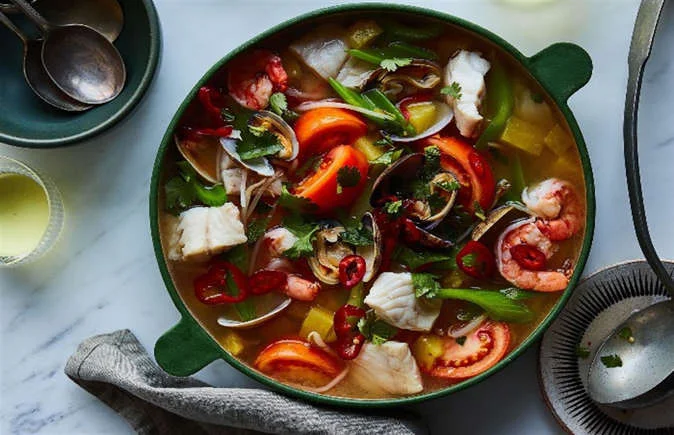
This delightful stew is a celebration of fresh ingredients and bold flavors.
Table: Tangy Vietnamese Seafood Stew
| Ingredient | Quantity |
|---|---|
| Canola oil | 1 tablespoon |
| Garlic cloves, minced | 2 |
| Water | 6 cups |
| Light or dark brown sugar, packed | 1 teaspoon |
| Pomegranate molasses | 1 tablespoon (or substitute – see recipe below) |
| Fish sauce | 1 ½ tablespoons |
| Sea salt, fine | ½ teaspoon |
| Pineapple chunks, fresh or frozen (bite-sized) | 8 ounces |
| Mild-flavored, firm fish fillet (snapper, tilapia, catfish), cut into 1 ½-inch chunks | 10 ounces |
| Shrimp (peeled, deveined; optional: tails on for presentation) | 8 extra-large or 12 large |
| Clams (Manila or littlenecks) or cockles (optional) | 8 ounces small |
| Celery stalk, thinly sliced diagonally (½-inch width) | 1 large |
| Tomato, unripe, wedged | 1 large |
| Bean sprouts | 2 cups |
| Fresh herbs, chopped (combination of cilantro, Thai basil, mint) | ⅓ cup |
| Ground cumin | ¼ teaspoon (rounded) |
| Fresno, jalapeño, or cayenne chile, thinly sliced (adjust for desired spice level) | 1 |
Optional Pomegranate Molasses:
- Pomegranate juice | 2 cups |
- Strained fresh lemon juice | 1 tablespoon + 1 teaspoon |
- Sugar | ¼ cup |
Instructions:
- For the Pomegranate Molasses (optional): Combine pomegranate juice, lemon juice, and sugar in a saucepan. Bring to a boil, then reduce heat and simmer for 20-25 minutes, until the mixture thickens to a syrup consistency. Set aside.
- Heat oil in a large pot or Dutch oven over medium-low heat. Add minced garlic and cook for 3 minutes, until fragrant.
- Pour in water and bring to a simmer. Stir in brown sugar, pomegranate molasses (or substitute with additional fish sauce and lime juice), fish sauce, and salt.
- Add pineapple, fish chunks, shrimp (if using), clams (if using), celery, and tomato. Increase heat to medium-high and bring to a boil.
- Reduce heat to medium-low and simmer for 8-10 minutes, or until fish is cooked through and clams have opened (discard any unopened clams).
- Stir in bean sprouts, herbs, cumin, and chili pepper. Cook for an additional minute, or until bean sprouts are slightly softened.
- Adjust seasonings with additional fish sauce, lime juice, or sugar to your taste preference.
- Serve hot with crusty bread or rice for a satisfying meal.
Tips:
- Substitute frozen seafood for fresh (ensure complete thawing before adding).
- Substitute the pomegranate molasses with a mixture of additional fish sauce and lime juice (if unavailable).
- Feel free to incorporate other vegetables like green beans, bell peppers, or carrots.
- Enhance the flavor by adding a tablespoon of tomato paste along with the water in step 3.
Skirt Steak with Chimichurri
Looking for a weeknight dinner that’s both impressive and effortless? Look no further than skirt steak with chimichurri! This Argentinian classic features tender, flavorful steak drizzled with a vibrant green sauce bursting with fresh herbs and a touch of garlic.
The beauty of chimichurri lies in its versatility. Prepare it ahead of time and let the flavors meld, then simply grill the steak and enjoy a delicious and satisfying meal in minimal time. While fries might be the traditional accompaniment, feel free to embrace your inner grill master and whip up some zucchini fries or roasted vegetables for a low-carb twist.
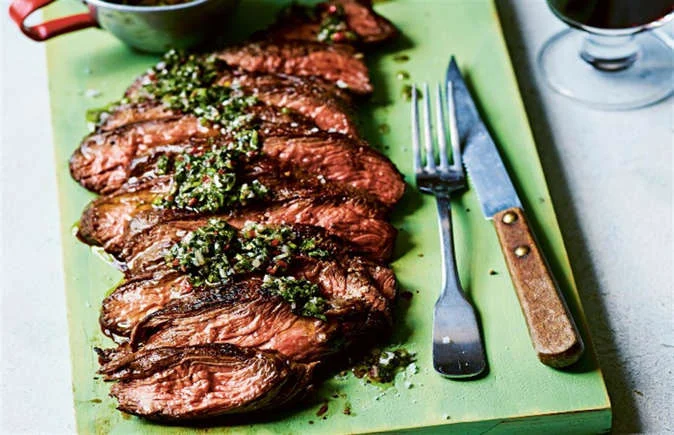
A crowd-pleasing combination of juicy steak and a vibrant green sauce.
Table: Skirt Steak with Chimichurri
| Ingredient | Quantity |
|---|---|
| Skirt steak | 1 pound |
| Extra virgin olive oil | 1/4 cup |
| Fresh parsley leaves, chopped | 1 cup |
| Fresh cilantro leaves, chopped | 1/2 cup |
| Oregano leaves, chopped (optional) | 1 tablespoon |
| Garlic cloves, minced | 3 |
| Red wine vinegar | 2 tablespoons |
| Fresh lime juice | 1 tablespoon |
| Red pepper flakes | 1/2 teaspoon (adjust for desired spice level) |
| Salt | 1 teaspoon |
| Black pepper | 1/2 teaspoon |
Instructions:
- For the Chimichurri: Combine olive oil, chopped parsley, cilantro, oregano (if using), garlic, red wine vinegar, lime juice, red pepper flakes, salt, and pepper in a food processor. Pulse until well chopped but not puréed. Alternatively, you can finely chop the herbs by hand and combine all ingredients in a bowl. Transfer to a serving bowl and set aside.
- Prepare the Steak: Pat the skirt steak dry with paper towels. Season generously with salt and pepper on both sides.
- Grill the Steak: Preheat your grill to high heat. Sear the steak for 2-3 minutes per side for medium-rare, or to your desired doneness.
- Rest the Steak: Transfer the steak to a cutting board and tent with foil. Let it rest for 10 minutes before slicing thinly against the grain.
- Serve: Serve the sliced steak drizzled with chimichurri sauce. Enjoy with your favorite grilled vegetables or a simple side salad.
Tips:
- Marinate the steak for 30 minutes to an hour in a mixture of olive oil, lime juice, and your favorite spices for extra flavor.
- If you don’t have a grill, you can cook the steak in a hot skillet over medium-high heat for 3-4 minutes per side.
- Leftover chimichurri can be stored in an airtight container in the refrigerator for up to 3 days.
Roast Avocado and Chicken with N’duja Butter
Craving a unique and flavorful weeknight dinner that comes together in a flash? Look no further than roast avocado and chicken with n’duja butter! This dish combines the richness of chicken with the creamy texture of avocado, all elevated by the vibrant flavors of n’duja – a soft, spicy sausage from southern Italy.
The beauty of this recipe lies in its simplicity. All the ingredients come together in a single tray, minimizing cleanup and maximizing flavor. Plus, the n’duja butter adds a punchy kick that perfectly complements the creamy avocado and tender chicken.
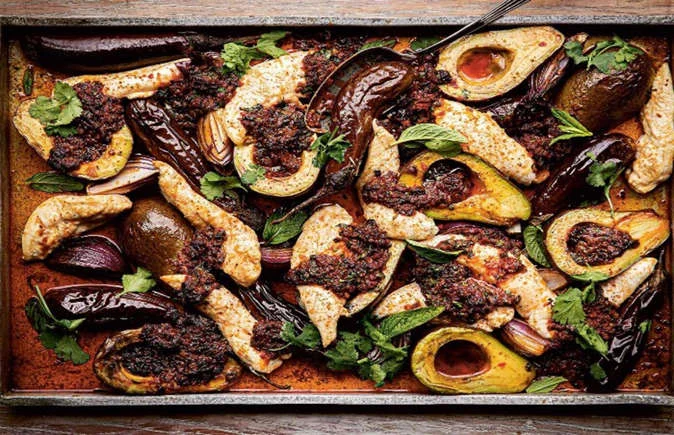
A one-pan wonder bursting with flavor and creamy textures.
Table: Roast Avocado and Chicken with N’duja Butter
| Ingredient | Quantity |
|---|---|
| Chicken breasts or thighs, boneless, skinless | 2 |
| N’duja | 2 tablespoons |
| Butter, softened | 2 tablespoons |
| Garlic cloves, minced | 2 |
| Lemon zest | 1 teaspoon |
| Lemon juice | 1 tablespoon |
| Olive oil | 1 tablespoon |
| Baby eggplants, halved | 2 |
| Avocado, halved | 1 |
| Cherry tomatoes | 10 |
| Salt | 1/2 teaspoon |
| Black pepper | 1/4 teaspoon |
| Fresh herbs (optional, for garnish) | Chopped parsley, basil, or thyme |
Instructions:
- Preheat the oven to 200°C (400°F).
- Prepare the N’duja Butter: In a small bowl, mash together softened butter, n’duja, minced garlic, lemon zest, and lemon juice.
- Season the Chicken: Pat the chicken dry with paper towels. Season generously with salt and pepper.
- Assemble the Traybake: In a large baking dish, toss baby eggplants with olive oil and a pinch of salt. Arrange them in a single layer.
- Prep the Avocado: Drizzle avocado halves with olive oil and season with salt and pepper. Place them cut-side down next to the eggplants.
- Add Chicken and Tomatoes: Nestle the chicken breasts or thighs in between the vegetables. Scatter cherry tomatoes around the pan.
- Dollop with N’duja Butter: Top each chicken piece with a generous dollop of n’duja butter.
- Roast: Bake for 20-25 minutes, or until the chicken is cooked through and the vegetables are tender.
- Serve: Garnish with fresh herbs (optional) and enjoy hot.
Tips:
- If your avocados are under-ripe, roast for an additional 5-10 minutes for a creamier texture.
- N’duja can be quite spicy. Adjust the amount to your preference.
- Substitute boneless, skinless pork chops or thighs for chicken, if desired.
- Leftovers can be stored in an airtight container in the refrigerator for up to 3 days.
Spiced Salmon with Pineapple Salsa
Looking for a healthy and flavorful dinner that’s ready in under 30 minutes? Look no further than spiced salmon with pineapple salsa! This dish boasts protein-packed salmon glazed with a delightful blend of spices, perfectly complemented by the refreshing kick of a vibrant pineapple salsa.
The beauty of this recipe lies in its focus on fresh ingredients. The salmon is simply seasoned with a touch of maple syrup and a symphony of warming spices, creating a flavorful crust without compromising its health benefits. The accompanying pineapple salsa adds a burst of freshness and a hint of heat, making it a perfect counterpoint to the richness of the fish.
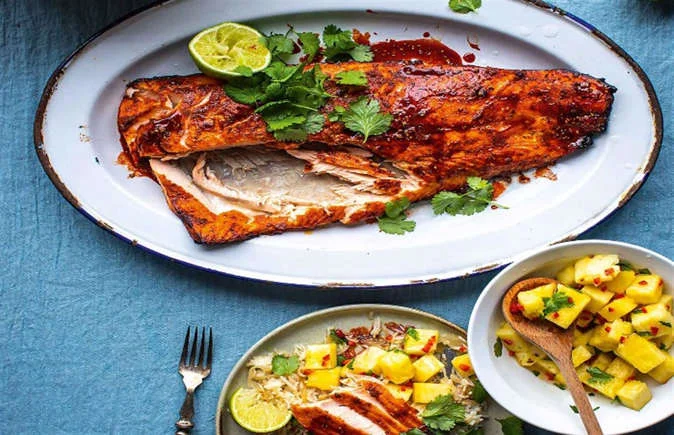
A light and flavorful dish that’s both healthy and satisfying.
Table: Spiced Salmon with Pineapple Salsa
| Ingredient | Quantity |
|---|---|
| Salmon fillets | 2 |
| Smoked paprika | 1 teaspoon |
| Cumin | ½ teaspoon |
| Cayenne pepper | Pinch (adjust for desired spice level) |
| Maple syrup | 1 tablespoon |
| Olive oil | 1 tablespoon |
| Fresh pineapple, diced | 1 cup |
| Red onion, finely diced | ¼ cup |
| Jalapeño pepper, seeded and finely diced (optional) | ½ (adjust for desired spice level) |
| Lime juice | 1 tablespoon |
| Fresh cilantro, chopped | ¼ cup |
| Salt | Pinch |
| Black pepper | Pinch |
Instructions:
- Prepare the Spice Rub: In a small bowl, combine smoked paprika, cumin, cayenne pepper, and maple syrup.
- Season the Salmon: Pat the salmon fillets dry with paper towels. Season generously with salt and pepper. Brush the top of each fillet with olive oil, then coat with the prepared spice rub.
- Make the Pineapple Salsa: In a medium bowl, combine diced pineapple, red onion, jalapeño (if using), lime juice, and chopped cilantro. Season with a pinch of salt and pepper.
- Cook the Salmon: Heat a skillet over medium heat. Add the salmon fillets, skin-side down (if skin-on). Cook for 4-5 minutes, or until the skin is crispy (if using skin-on). Gently flip the salmon and cook for an additional 3-4 minutes, or until cooked through and flaky.
- Serve: Transfer the cooked salmon to plates. Top with a generous serving of pineapple salsa and enjoy with a side salad or your favorite vegetables.
Tips:
- Serve the salmon with a bed of cooked brown rice or quinoa for a more complete meal.
- If you don’t have fresh jalapeño, you can substitute with a pinch of red pepper flakes for a touch of heat.
- Leftover salmon can be stored in an airtight container in the refrigerator for up to 3 days.
Feta, Spinach, and Caramelized Onion Omelet
Sometimes, the simplest meals can be the most satisfying. Introducing the feta, spinach, and caramelized onion omelet – a low-carb champion perfect for busy mornings or light lunches. This protein-packed dish features creamy eggs, bursting with the sweetness of caramelized onions, the salty tang of feta cheese, and the freshness of spinach.
The beauty of this recipe lies in its versatility. While caramelized onions add a touch of sweetness and depth of flavor, feel free to use chopped scallions for an even faster preparation. This omelet comes together in minutes, making it a perfect solution for those mornings when time is of the essence.
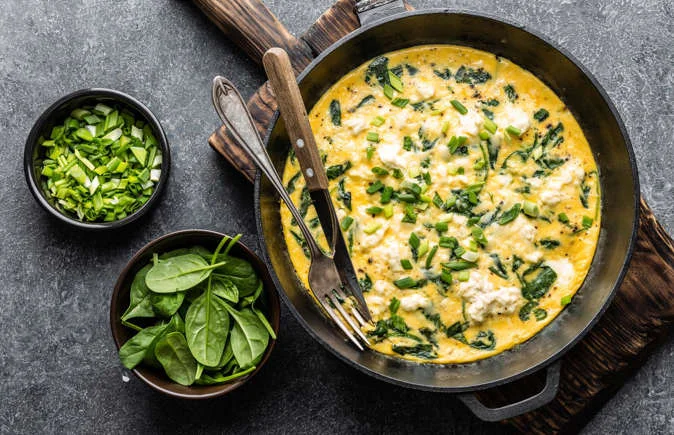
A low-carb champion packed with protein and flavor.
Table: Feta, Spinach, and Caramelized Onion Omelet
| Ingredient | Quantity |
|---|---|
| Eggs | 3 |
| Milk or water | 1 tablespoon |
| Olive oil | 1 tablespoon |
| Red onion, thinly sliced | ½ medium |
| Salt | Pinch |
| Black pepper | Pinch |
| Baby spinach, fresh | 2 handfuls |
| Feta cheese, crumbled | ¼ cup |
Instructions:
- Caramelize the Onions (Optional): Heat olive oil in a skillet over medium heat. Add the sliced red onion and cook for 15-20 minutes, stirring occasionally, until softened and caramelized. Season with a pinch of salt.
- Whisk the Eggs: In a medium bowl, whisk together eggs, milk (or water), salt, and pepper.
- Cook the Spinach: While the onions are caramelizing (or in a separate pan if using scallions), heat a cast iron skillet or nonstick pan over medium heat. Add the spinach and cook for 1-2 minutes, or until wilted.
- Cook the Omelet: Add a drizzle of olive oil to the pan. Pour in the whisked egg mixture. Swirl the pan to coat the bottom evenly.
- Add Fillings: Once the edges start to set (about 1-2 minutes), sprinkle the cooked spinach and crumbled feta cheese over one half of the omelet.
- Fold and Serve: Using a spatula, fold the other half of the omelet over the fillings. Cook for an additional 1-2 minutes, or until cooked through. Slide the omelet onto a plate and enjoy!
Tips:
- Substitute chopped scallions for caramelized onions for a quicker preparation.
- Feel free to add other ingredients to your omelet, such as chopped ham, crumbled sausage, or diced bell peppers.
- Leftover omelet can be stored in an airtight container in the refrigerator for up to 2 days and reheated in a skillet or microwave.
Vietnamese Chicken Salad
Calling all health-conscious foodies! In the realm of quick and easy weeknight meals, Vietnamese chicken salad reigns supreme. This vibrant dish boasts a symphony of fresh ingredients, bursting with fragrant herbs, a touch of chili, and a delightful sweet-and-savory dressing.
The beauty of Vietnamese chicken salad lies in its focus on clean, wholesome ingredients. Shredded chicken serves as the protein base, while a medley of fresh vegetables and herbs adds vibrant colors and textures. The key to this dish lies in the balanced dressing, which incorporates a hint of sugar to complement the savory and spicy notes without compromising your low-carb goals. Toasted peanuts and sesame seeds add a delightful final touch, providing a satisfying crunch with every bite.
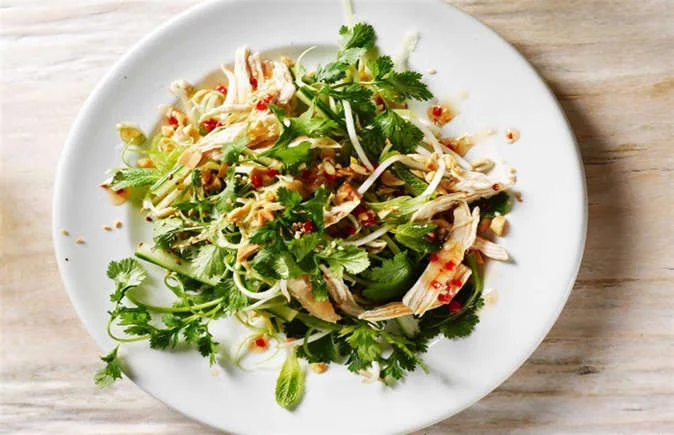
A light and refreshing salad bursting with bold flavors and textures.
Table: Vietnamese Chicken Salad
| Ingredient | Quantity |
|---|---|
| Cooked chicken breasts, shredded | 2 cups |
| Napa cabbage, thinly shredded | 4 cups |
| Carrots, julienned | 1 cup |
| Red onion, thinly sliced | ¼ cup (optional) |
| Cucumber, thinly sliced | 1 cup (optional) |
| Fresh mint leaves, chopped | ½ cup |
| Fresh cilantro leaves, chopped | ½ cup |
| Roasted peanuts, chopped | ½ cup |
| Sesame seeds, toasted | ¼ cup |
For the Dressing:
- Lime juice | 2 tablespoons
- Fish sauce | 1 tablespoon
- Rice vinegar | 1 tablespoon
- Sugar | 1 teaspoon
- Garlic clove, minced | 1
- Water | 1 tablespoon
- Red chili pepper, thinly sliced (optional) | To taste
Instructions:
- Prepare the Salad: In a large bowl, combine shredded chicken, Napa cabbage, julienned carrots, red onion (if using), cucumber (if using), chopped mint, and chopped cilantro.
- Make the Dressing: In a small bowl, whisk together lime juice, fish sauce, rice vinegar, sugar, minced garlic, water, and chili pepper (if using). Adjust the amount of chili pepper to your desired spice level.
- Toast the Sesame Seeds (Optional): Heat a small skillet over medium heat. Add sesame seeds and toast for 2-3 minutes, stirring frequently, until golden brown. Be careful not to burn them.
- Toss and Serve: Pour the dressing over the salad and toss to coat evenly. Sprinkle with chopped peanuts and toasted sesame seeds (if using). Serve immediately.
Tips:
- For a vegetarian option, substitute the chicken with crumbled tofu.
- Feel free to add other vegetables to the salad, such as shredded bell peppers, bean sprouts, or fresh herbs like Thai basil.
- Leftover salad can be stored in an airtight container in the refrigerator for up to 2 days. The dressing can be stored separately for longer shelf life.
Chicken Casserole with Sage and Crème Fraîche
Craving a comforting and flavorful dinner that practically cooks itself? Look no further than this classic chicken casserole! This dish features tender chicken thighs nestled in a rich and savory broth infused with white wine, herbs, and smoky bacon.
The beauty of this recipe lies in its ease of preparation. With minimal prep time, you can let your oven do the magic, transforming simple ingredients into a heartwarming and satisfying meal. The addition of crisp sage leaves provides a delightful textural contrast, while crème fraîche, stirred in towards the end, adds a touch of creamy richness.
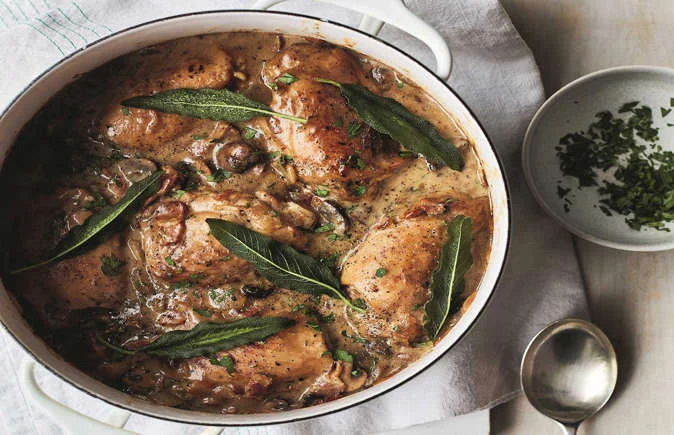
A comforting classic bursting with rich flavors and textures.
Table: Chicken Casserole with Sage and Crème Fraîche
| Ingredient | Quantity |
|---|---|
| Bone-in, skin-on chicken thighs | 4-6 |
| Smoked bacon lardons | 4-5 rashers, chopped |
| Olive oil | 1 tablespoon |
| Onion, diced | 1 large |
| Garlic cloves, minced | 2 |
| Dried thyme | 1 teaspoon |
| Dried bay leaves | 2 |
| White wine | ½ cup |
| Chicken stock | 2 cups |
| Crème fraîche | ½ cup |
| Fresh sage leaves | 10-12 |
| Salt and freshly ground black pepper | To taste |
Instructions:
- Preheat the oven to 180°C (350°F).
- Brown the Chicken and Bacon: Heat olive oil in a large ovenproof Dutch oven or casserole dish over medium heat. Season the chicken thighs with salt and pepper. Sear them on all sides until golden brown. Remove the chicken from the pot and set aside.
- Sauté the Aromatics: Add the chopped bacon to the pot and cook for 2-3 minutes, until crispy. Add the diced onion and cook for an additional 5 minutes, or until softened. Stir in the minced garlic and dried thyme, and cook for another minute, until fragrant.
- Deglaze with Wine: Pour in the white wine and scrape up any browned bits from the bottom of the pot. Let the wine simmer for 2-3 minutes, allowing the alcohol to cook off.
- Add Broth and Herbs: Add the chicken stock, bay leaves, and a generous pinch of salt and pepper. Bring to a simmer.
- Return the Chicken: Return the browned chicken pieces to the pot, nestling them skin-side up in the broth. Cover the pot and transfer it to the preheated oven.
- Bake: Bake for 45-50 minutes, or until the chicken is cooked through and tender. The juices should run clear when the thickest part of the thigh is pierced with a knife.
- Finish with Crème Fraîche and Sage: Remove the pot from the oven. Stir in the crème fraîche and fresh sage leaves. Return the pot to the oven, uncovered, and bake for an additional 5-10 minutes, or until the sauce thickens slightly and the sage leaves are crispy.
- Serve: Serve the chicken casserole hot, spooning the sauce over the chicken and vegetables. Enjoy with a side of buttered greens or mashed potatoes.
Tips:
- You can substitute boneless, skinless chicken thighs for bone-in, skin-on thighs. Adjust the cooking time accordingly, as boneless thighs cook faster.
- Feel free to add other vegetables to the casserole, such as carrots, celery, or mushrooms. Simply add them to the pot with the onions in step 3.
- Leftovers can be stored in an airtight container in the refrigerator for up to 3 days. Reheat gently on the stovetop over low heat.
Lamb-Stuffed Eggplants with Manchego
Embark on a culinary adventure to Spain with this flavorful lamb-stuffed eggplants with manchego! This dish is a captivating fusion of textures and tastes, featuring tender roasted eggplants brimming with a vibrant lamb ragù and finished with a blanket of melted manchego cheese.
The beauty of this recipe lies in its celebration of simple ingredients. Roasted eggplants provide a naturally low-carb base, perfectly suited for health-conscious foodies. The lamb ragù, bursting with savory spices, adds a touch of indulgence without compromising your dietary goals. Manchego cheese, or a mature cheddar as a substitute, melts beautifully, creating a delightfully gooey finish.
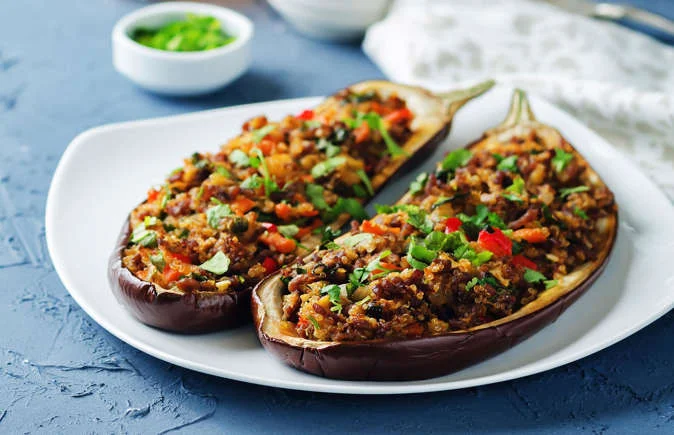
A low-carb twist on a Spanish classic, bursting with flavor and textures.
Table: Lamb-Stuffed Eggplants with Manchego
| Ingredient | Quantity |
|---|---|
| Eggplants | 2 large |
| Olive oil | 2 tablespoons |
| Salt | To taste |
| Ground lamb | 500g (1.1 lbs) |
| Onion, diced | 1 large |
| Garlic cloves, minced | 2 |
| Ground cumin | 1 teaspoon |
| Smoked paprika | 1 teaspoon |
| Pinch of red pepper flakes (adjust for desired spice level) | |
| Canned chopped tomatoes (undrained) | 400g (14 oz) |
| Beef broth | 1 cup |
| Fresh parsley, chopped | ¼ cup |
| Manchego cheese, grated (or mature cheddar) | 100g (3.5 oz) |
Instructions:
- Preheat the oven to 200°C (400°F).
- Prepare the Eggplants: Slice the eggplants in half lengthwise. Drizzle the flesh with olive oil and season with salt. Place them cut-side down on a baking sheet and roast for 20-25 minutes, or until softened and scooping out the flesh becomes easy.
- Cook the Lamb Ragù: While the eggplants roast, heat olive oil in a large skillet over medium heat. Add the ground lamb and cook, breaking it up with a spoon, until browned.
- Sauté the Aromatics: Add the diced onion and cook for an additional 5 minutes, or until softened. Stir in the minced garlic, ground cumin, smoked paprika, and red pepper flakes (if using). Cook for another minute, until fragrant.
- Simmer the Sauce: Pour in the chopped tomatoes (with their juices), beef broth, and a pinch of salt. Bring to a simmer and cook for 15-20 minutes, or until the sauce thickens slightly.
- Scoop and Reserve Eggplant Flesh: Remove the roasted eggplants from the oven and let them cool slightly. Using a spoon, carefully scoop out the flesh, leaving a 1/2-inch border around the edges. Roughly chop the scooped-out eggplant flesh.
- Assemble the Eggplants: Stir the chopped eggplant flesh into the simmering lamb ragù. Season with additional salt to taste. Divide the ragù mixture evenly between the roasted eggplant halves.
- Top with Cheese: Sprinkle the grated manchego cheese (or cheddar) over the stuffed eggplants.
- Bake: Bake for an additional 10-15 minutes, or until the cheese is melted and bubbly.
- Serve: Garnish with fresh chopped parsley and serve hot.
Tips:
- Leftovers can be stored in an airtight container in the refrigerator for up to 3 days. Reheat gently in the oven or microwave until warmed through.
- Feel free to add other vegetables to the lamb ragù, such as chopped carrots, celery, or bell peppers.
- If you prefer a vegetarian option, substitute the lamb with lentils or crumbled tofu.
Salade Niçoise
Looking for a taste of the South of France without leaving your kitchen? Look no further than the Salade Niçoise! This vibrant salad is a delightful celebration of fresh and flavorful ingredients, perfect for a light and satisfying meal.
While there may be some debate about the “correct” ingredients for a Salade Niçoise, this recipe captures the essence of the dish with its focus on high-quality protein and vibrant Mediterranean flavors. Top-quality canned tuna is joined by perfectly cooked eggs, briny olives, juicy tomatoes, and fresh basil, all tossed in a simple yet elegant dressing of red wine vinegar and olive oil.
The beauty of Salade Niçoise lies in its simplicity. Fresh ingredients are allowed to shine, creating a symphony of textures and tastes that is both refreshing and satisfying.
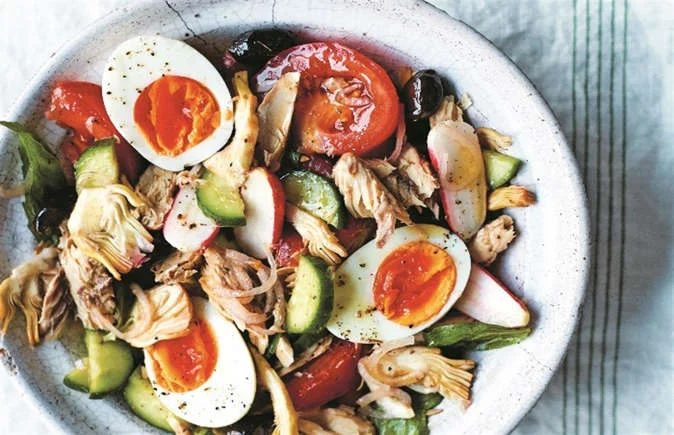
A taste of southern France bursting with fresh flavors and textures.
Table: Salade Niçoise
| Ingredient | Quantity |
|---|
- High-quality canned tuna in olive oil | 2 x 185g (6.5 oz) cans, drained |
- Hard-boiled eggs | 4 |
- Tomatoes | 2 large, ripe |
- Kalamata olives, pitted | ½ cup |
- Red onion, thinly sliced | ¼ cup (optional)
- Green beans, trimmed and cooked | 1 cup (optional) |
- Fresh basil leaves | ½ cup, roughly chopped |
- Red wine vinegar | 2 tablespoons |
- Extra virgin olive oil | 4 tablespoons |
- Salt and freshly ground black pepper | To taste |
Instructions:
- Prepare the Hard-Boiled Eggs: Place the eggs in a saucepan and cover with cold water. Bring to a boil, then remove from heat and cover for 10-12 minutes. Drain the hot water and rinse the eggs under cold running water until cool enough to handle. Peel and slice the eggs into quarters.
- Prepare the Vegetables: Wash and slice the tomatoes into wedges.
- Assemble the Salad: In a large serving bowl, combine the flaked tuna, quartered eggs, sliced tomatoes, pitted olives, red onion (if using), and cooked green beans (if using).
- Make the Dressing: In a small bowl, whisk together red wine vinegar, olive oil, salt, and freshly ground black pepper.
- Toss and Serve: Drizzle the dressing over the salad and gently toss to coat all ingredients. Garnish with fresh chopped basil and serve immediately.
Tips:
- Feel free to add other vegetables to the salad, such as roasted red peppers, artichoke hearts, or asparagus.
- If you don’t have fresh basil, substitute with another fresh herb like parsley or chives.
- Leftovers can be stored in an airtight container in the refrigerator for up to 1 day. The dressing can be stored separately for longer shelf life.
Sichuan: Water-Cooked Beef
Sichuan cuisine, celebrated for its fiery spice and unique numbing quality, offers a captivating exploration for adventurous palates. This recipe for Sichuan water-cooked beef serves as an ideal introduction to the bold flavors of this regional Chinese tradition.
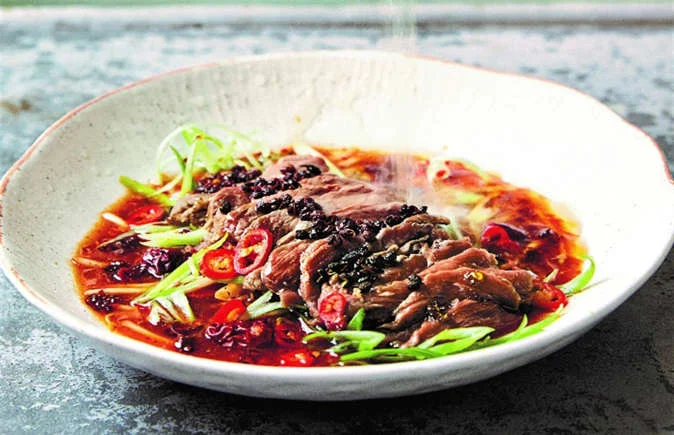
A Symphony of Textures and Spice
This dish presents a captivating interplay of contrasting textures and electrifying tastes. Thinly sliced beef, meticulously cut against the grain, is seared with blazing hot oil for an incredibly tender and melt-in-your-mouth experience. The vibrant broth, the heart of this recipe, delivers a complex melody of savors. Soy sauce and sesame paste contribute rich, umami notes, while the signature Sichuan peppercorns introduce a unique numbing sensation that complements the dish’s inherent heat.
A Streamlined Approach to Bold Flavors
The beauty of Sichuan water-cooked beef lies in its deceptive simplicity. The preparation method involves a two-step cooking process for the beef. First, the meat is marinated to enhance tenderness and imbued with flavor. Then, each individual slice is swiftly cooked in scorching oil, ensuring a stunning textural contrast between the incredibly tender meat and the crisp vegetables nestled below. The accompanying broth is a symphony of readily available ingredients, brought together to create a flavor profile unlike any other.
Yields: 2 Servings
Table: Sichuan Water-Cooked Beef
| Ingredient | Quantity |
|---|---|
| For the Marinated Beef: | |
| Beef fillet, thinly sliced against the grain | 250 grams (½ pound) |
| Shaoxing rice wine (or dry sherry) | 1 tablespoon |
| Light soy sauce | 1 tablespoon |
| Cornstarch | 1 tablespoon |
| For the Sauce: | |
| Chicken stock | 500 milliliters (2 cups) |
| Doubanjiang (fermented broad bean paste) | 2 tablespoons |
| Light soy sauce | 1 tablespoon |
| Sugar | 1 teaspoon (adjust to preference) |
| Salt | To taste |
| For the Garnish: | |
| Fresh bean sprouts (optional) | 150 grams (5 ounces) |
| Spring onions (scallions), thinly sliced on the diagonal | 3 |
| Toasted Sichuan peppercorns, ground (optional) | 1-2 tablespoons (adjust for spice level) |
| Vegetable oil, for frying and ½ cup hot oil |
Instructions:
- Marinate the Beef: In a bowl, combine the thinly sliced beef with Shaoxing rice wine (or dry sherry), light soy sauce, and cornstarch. Toss to coat and marinate for at least 15 minutes, allowing the flavors to penetrate the meat.
- Prepare the Sauce: In a separate bowl, whisk together chicken stock, doubanjiang, light soy sauce, sugar, and salt. Set aside until ready to use.
- Blanch the Bean Sprouts (Optional): In a pot of boiling water, blanch the bean sprouts for 30 seconds to achieve a slight softening. Drain and set aside.
- Heat the Oil: Heat a wok or large skillet over medium-high heat. Add enough vegetable oil for frying and bring to a temperature of around 180°C (350°F) using a kitchen thermometer for optimal control.
- Cook the Beef: While the oil heats, arrange the marinated beef slices on a plate in a single layer. Carefully lift the slices of beef one by one and swirl them gently in the hot oil for a few seconds, until just cooked through (about 5-10 seconds per slice). Monitor the cooking process closely to ensure proper doneness. Remove with a slotted spoon and drain on paper towels.
- Assemble the Dish: In a serving bowl, arrange the blanched bean sprouts (if using). Top with the cooked beef slices.
- Simmer the Sauce: Heat the remaining ½ cup of hot oil in a wok or pan over medium heat. Carefully pour the hot oil over the beef and bean sprouts in the serving bowl. This will cook the vegetables slightly and infuse them with flavor.
- Serve: Pour the prepared sauce over the beef and vegetables. Garnish with chopped spring onions (scallions) and ground Sichuan peppercorns (if using). Serve immediately with steamed rice for a complete and balanced meal.
Tips:
- Ensure the oil is hot enough before cooking the beef. If the oil is not hot enough, the beef will not cook through properly and may become tough.
- Adjust the amount of Sichuan peppercorns to your desired spice level. This numbing spice adds a unique dimension to the dish, but its use
